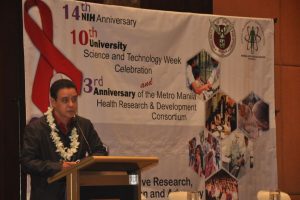NEWS AND UPDATES
Global Fund-Malaria project strengthens malaria control and treatment in the country

“Malaria is one of the most persistent mosquito-borne infection in the Philippines. Prevalent areas are usually rural, mountainous and hard to reach.â€
Dr. Antonio B. Bautista, Deputy Program Manager of the Field Operations Consolidated Global Fund Malaria Project from the Pilipinas Shell Foundation, Inc (PSFI), presented the status of malaria in the Philippines during the scientific conference of the 14th National Institutes of Health (NIH) anniversary last February.
The Philippines is one of the 20 countries in East Asia and the Pacific availing the Global Fund (GF) opportunity which is a unique global public/private partnership dedicated to attracting and disbursing additional resources to prevent and treat HIV/AIDS, tuberculosis and malaria.
In 2003, PSFI assisted in the formulation and development of the GF Round 2 project proposal for malaria. It was in 2005 when PSFI became the country’s principal recipient of the GF-Malaria grant covering the five most endemic provinces of the Philippines through the endorsement of the Country Coordinating Mechanism (CCM).
Dr. Bautista reported that before GF, 79 provinces were categorized endemic in the Philippines and only 13 were malaria-free provinces (1991-2002).
“Working with the GF, the project’s target was to cover 26 provinces by 2010. Strategies in reaching our target was through building local capacities, early diagnosis and prompt treatment, strengthening vector control, strengthening surveillance and epidemic management, ensuring quality of services, intensifying health promotion and establishing and expanding networks and collaborations,†said Dr. Bautista.
As early as 2008, the project reached the target of 76.8% reduction in morbidity rate of the 26 endemic provinces and a 90% reduction in mortality rate. The 13 Malaria-free provinces in 2002 became 23 Malaria-free provinces in 2008.
In 2009, the GF saw it fit to consolidate three projects on malaria: GF Round 2, Round 5 and Round 6. Their objectives were to ensure universal access to reliable diagnosis, highly effective and appropriate treatment and preventive measures, capacitate LGUs to own manage and sustain the Malaria Program in their respective localities, sustain financing of anti-malaria efforts at all levels of operations and ensure a functioning quality assurance system for Malaria operations.
From 2009-2010, the project have established 552 Rapid Diagnostic Test (RDT) sites and 987 Microscopy centers. In 2011, 95% of the diagnostic and treatment facilities were reported functional.
In strengthening and expanding vector control services in the country, the consolidated project have already distributed 2.7 million bed nets in a period of 2 years and 576,000 houses were sprayed with insecticides and 996,000 pregnancy packages were distributed among the 40 provinces in the Philippines (21 in Luzon and 19 in Mindanao).
Dr. Bautista reported that in 2011, the total LGU spending on Malaria amounted to 59 million and the DOH budget for Malaria was raised at 162 million.
“We are already doing everything. We just need to do it more correctly, regularly and in a timely manner,†concluded Dr. Bautista.




